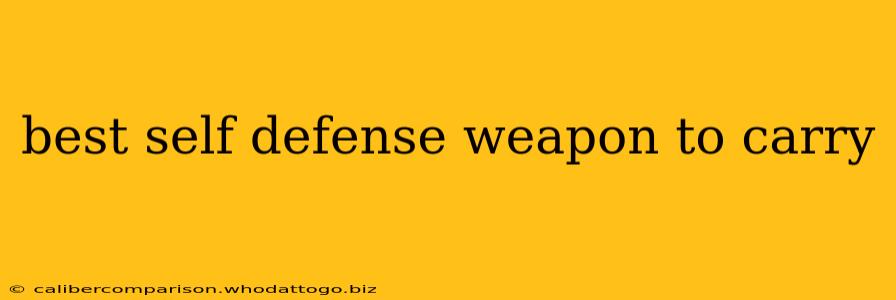Choosing the right self-defense weapon is a deeply personal decision, heavily influenced by individual factors like physical capabilities, legal restrictions, and comfort levels. There's no single "best" weapon, but understanding the pros and cons of various options empowers you to make an informed choice. This guide explores popular options, emphasizing responsible ownership and legal compliance.
Factors to Consider Before Choosing a Self-Defense Weapon
Before diving into specific weapons, consider these crucial factors:
- Legality: Laws regarding self-defense weapons vary significantly by location. Carrying a weapon legally requires understanding and adhering to all local, state, and federal regulations. Ignorance of the law is not a defense. Research your area's laws meticulously before purchasing or carrying any weapon.
- Training: Effective self-defense involves more than just possessing a weapon; it necessitates proper training. Learn how to use your chosen weapon safely and effectively. Improper use can lead to injury or legal ramifications.
- Physical Capabilities: Consider your physical strength, dexterity, and overall fitness. A weapon that's easy for one person to handle might be cumbersome or dangerous for another.
- Comfort and Confidence: You need to be comfortable and confident using your chosen weapon. If you're hesitant or unsure, it will likely hinder your effectiveness in a self-defense situation.
- Maintenance: All weapons require regular cleaning and maintenance. Factor this into your decision-making process.
Popular Self-Defense Weapon Options
Let's examine some common self-defense tools:
1. Pepper Spray
- Pros: Relatively easy to use, legal in most jurisdictions (with restrictions), relatively inexpensive, and readily available. Causes temporary incapacitation without causing lasting harm.
- Cons: Ineffective against determined attackers, can be affected by wind, requires precise aiming, and may not work on everyone.
2. Personal Alarm
- Pros: Simple, lightweight, inexpensive, and legal almost everywhere. A loud alarm can deter attackers and attract attention.
- Cons: Requires a clear line of sight to activate, may not deter a determined attacker, and depends on the proximity of others to hear it.
3. Kubotan or Tactical Pen
- Pros: Discreet, legal in most places, can be used for striking pressure points or delivering strikes. Provides a degree of leverage in a self-defense scenario.
- Cons: Requires training to use effectively, limited range, and potential for accidental injury if not used properly.
4. Non-Lethal Self-Defense Tools (Stun Guns, Tasers)
- Pros: Can incapacitate an attacker temporarily, relatively easy to use (with proper training).
- Cons: Legal restrictions vary widely; may not be effective against certain individuals or in specific circumstances; requires close-range contact; potential for misuse and legal repercussions.
Choosing the Right Weapon for You
The "best" self-defense weapon is subjective. The ideal choice depends entirely on your individual circumstances, capabilities, and comfort level. Consider your lifestyle, the environments you frequent, and your personal physical limitations.
Prioritize training: Regardless of your chosen weapon, professional self-defense training is essential. Learning proper techniques, legal considerations, and de-escalation strategies significantly enhances your safety and preparedness.
Disclaimer: This information is for educational purposes only and should not be considered legal advice. Always consult with legal professionals and law enforcement to ensure compliance with all applicable laws and regulations regarding self-defense weapons in your jurisdiction. This information does not constitute an endorsement of any specific self-defense weapon. Responsible ownership and proper training are crucial for safe and effective self-defense.

